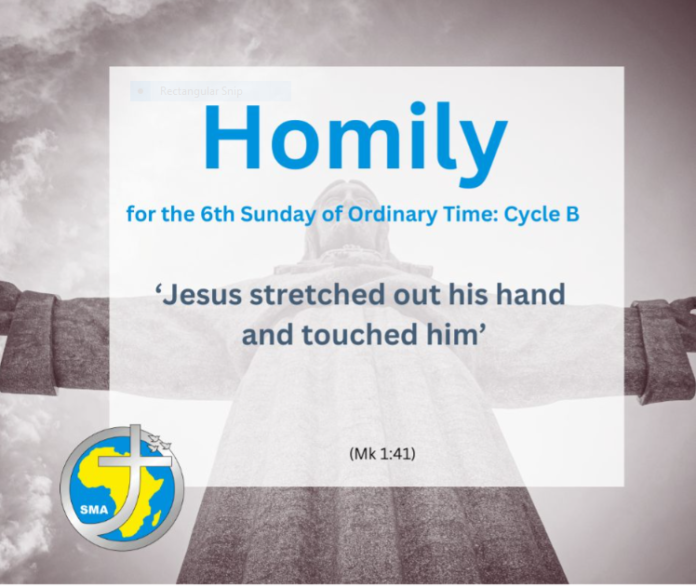Readings: Leviticus 13:1-2,44-46; 1 Corinthians 10:31-11:1; Mark 1:40-45
Theme: ‘Jesus stretched out his hand and touched him’ (Mk 1:41)
In biblical times, leprosy covered a wide range of skin diseases from ringworm and psoriasis to what is today known as Hansen’s disease – a truly horrific condition which, if untreated, can lead to loss of fingers and toes and other deformities of the body. Fear of contagion forced victims to live outside the community and endure the most frightful and humiliating form of isolation imaginable. Lepers were treated as outcasts, pariahs, untouchables.
The miserable plight of lepers was made even worse by the ingrained belief that their disease was a punishment from God for sin. Thus, to their physical affliction was added the psychological and mental torment of feeling rejected not only by society but even by God. As our first reading from the Book of Leviticus makes clear, a leper was declared ‘unclean’ by one of the priests, compelled to wear ‘his clothing torn and his hair disordered’, to ‘shield his upper lip and cry, “Unclean, unclean”, and to ‘live outside the camp’ (Lev 13: 45-46). Moreover, Jewish Law forbade anyone from approaching or touching a leper under the pain of incurring ritual defilement. Hence the life of a leper at the time of Jesus was nothing short of a ‘living hell’. Death would have been preferable.
This context makes the story of Jesus’ cure of a leper in today’s gospel quite remarkable. First, there is the extraordinary courage and faith of the leper. In spite of the frightful stigma he had to endure, he still has the courage to approach Jesus, trusting that he will accept and cure him. To come close to Jesus he had to risk the anger of the people around Jesus and the likelihood of been chased away with stones. With an exemplary combination of faith and humility he goes down on his knees before Jesus and pleads with him in words that must have wrung the very heart of Jesus: “If you want to, your can cure me” (Mk 1:40).
Even more extraordinary is the response of Jesus, especially the manner in which he cures the leper. Moved with compassion for the leper, he says: “Of course I want to. Be cured” (Mk1:41) And, with a gesture not only forbidden by the Mosaic Law but profoundly counter-cultural, he reaches out and touches the leper with his hand. This gesture – touching the untouchable – spoke more eloquently than any words could and brought spiritual as well as physical healing to the unfortunate man. It was a gesture of acceptance and empathy that restored the leper’s humanity and sense of self-worth as well as curing him physically: ‘At once the leprosy left him and he was cured’ (Mk1.42). And despite Jesus’ warning, the healed leper cannot keep the good news of his cure to himself. He must speak of it to everyone he meets with the unfortunate consequence that Jesus has to leave town and go to place where nobody lived.
Today’s gospel reminds us that touch is one of our most fundamental human needs. To be touched and to be able to touch is at the very core of what it means to be human. Far more than words, touch conveys concern, empathy, support and affirmation. The importance of touch was brought home to me forty years ago when I was teaching in a seminary in Liberia. Every weekend, along with a small group of seminarians, I went to visit a Leprosarium in a place called Suakoko, about six miles from the seminary, bringing some rice and fruit, and leading a prayer service with the members of the Leper community. The highlight of the prayer service was always the kiss of peace, when all decorum was abandoned, and everyone went around shaking hands with everyone else – not the restrained handshake with the person beside you that we are accustomed to in Ireland. I should add that the leprosy was inactive so there was no risk of contagion. At that moment the small assembly became alive and radiated a joy that was truly infectious. This was an experience that make a lasting impression on me and taught me more about the message of Christ than many homilies.
As disciples of Jesus we are called, like St Paul, to model our lives on Christ, to reach out to others with compassion and love, especially to those who are rejected and stigmatised in any way. The love of God impels us to imitate the example of Jesus and bring his compassionate and healing touch to the lepers of our time, the many isolated, despised and broken men and women longing for acceptance and love. I will end with a reflection on the importance of touch from the pen of Flor McCarthy, SDB.
‘Many of us are afraid to touch other people.
We give a few pennies to a beggar,
but made sure there is no contact between us,
not even eye-contact.
Jesus didn’t stand off or keep his distance.
He wasn’t afraid to touch others.
He touched lepers, sinners, sick people,
and even the dead.
Physical contact is precisely what gives people,
especially sick and wounded people,
a sense of warmth and joy.
By the very act of touching another person,
we accept that person as he or she is.
Lord give us a warm heart and kind hands.
Fr Michael McCabe SMA
To listen to an alternative Homily for this Sunday, from Fr Tom Casey of the SMA Media Centre, Ndola, Zambia please click on the play button below.
| will be published when received |

